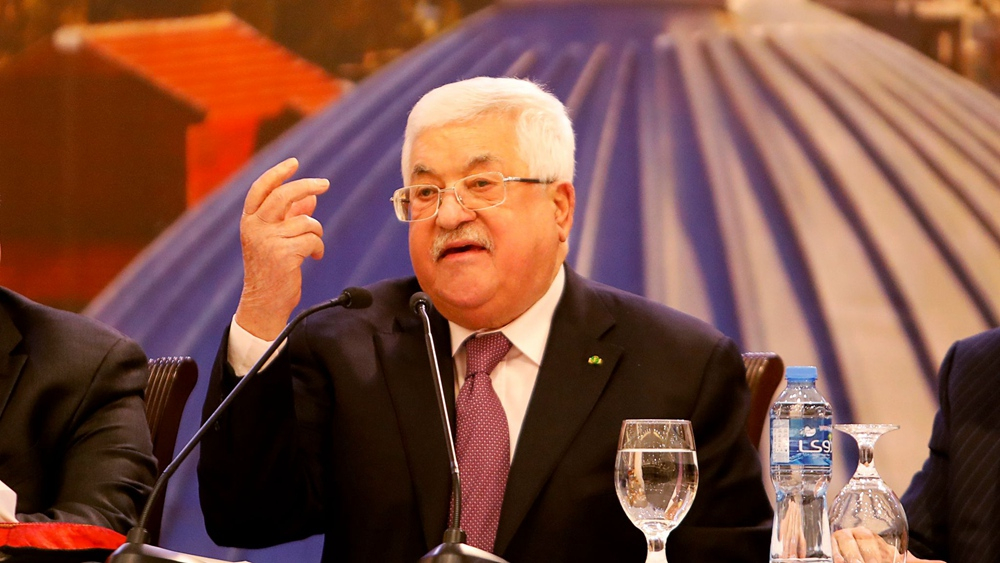
Palestinian President Mahmoud Abbas delivers a speech after U.S. President Donald Trump announces his Middle East peace plan, in Ramallah in the Israeli-occupied West Bank, January 28, 2020. /Reuters Photo
Palestinian President Mahmoud Abbas delivers a speech after U.S. President Donald Trump announces his Middle East peace plan, in Ramallah in the Israeli-occupied West Bank, January 28, 2020. /Reuters Photo
Palestinian President Mahmoud Abbas on Tuesday announced that he will change the role of the current Palestinian Authority in response to U.S. President Donald Trump's announced Middle East peace plan.
However, Abbas didn't give any more information about what the steps will be.
The Palestinian Authority is the interim self-governing body established in 1994 following the Gaza-Jericho agreement to govern the Gaza Strip and Areas A and B of the West Bank as a result of the 1993 Oslo Accords.
Speaking to reporters after an urgent leadership meeting in the West Bank city of Ramallah, the Palestinian president completely rejected Trump's peace plan, also known as the Deal of the Century, saying the plan "will not pass and will end in the dustbin of history."
He described it as "the mockery slap of the century" and called for unity and the right of return of all Palestinians.
"With the support of free people around the world, this plot will fail," Abbas said.
"Jerusalem is not for sale," he said. "Your conspiracy deal will not pass and the Palestinian people will reject it."
"Jerusalem is the capital of the State of Palestine," Abbas noted.
02:50
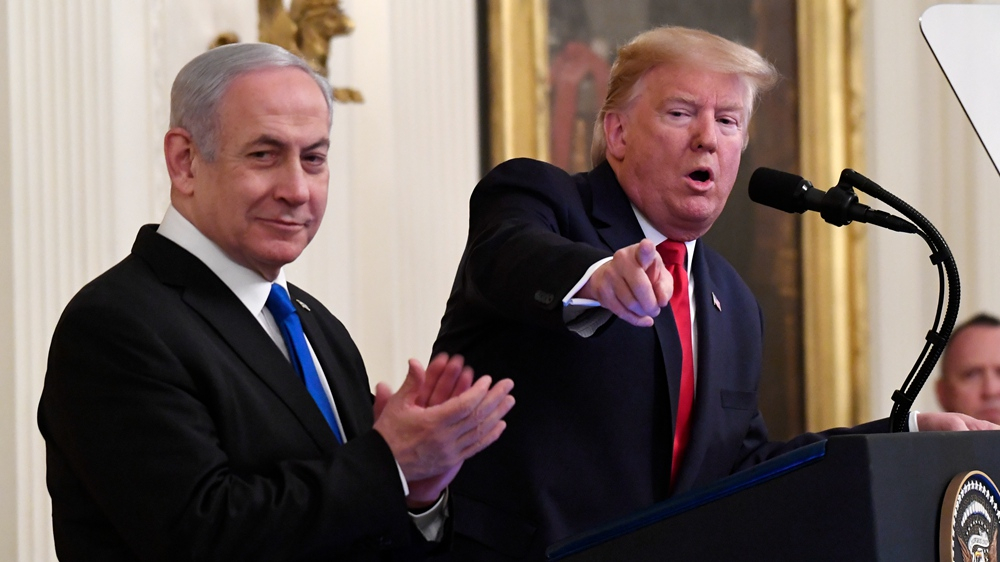
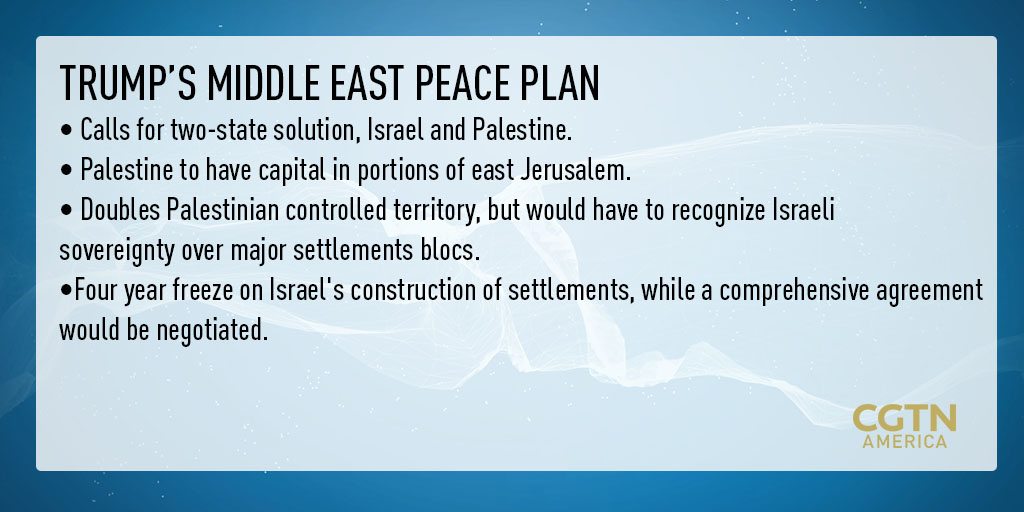
Abbas also said Trump's plan represents a return to the 1917 Balfour Declaration.
The Balfour Declaration was a statement by the British government on November 2, 1917 that announced its support for the Jewish people to build their state on the lands of Palestine.
"We are committed to negotiations on the basis of international legitimacy because it is our reference," Abbas said.
At a White House ceremony attended by Israeli Prime Minister Benjamin Netanyahu earlier in the day, Trump announced a plan that would allow the creation of a Palestinian state with a capital in parts of East Jerusalem, in an effort to achieve a peace breakthrough with Israel that will be a tough sale for Palestinians.
Under the proposed plan, the United States will recognize Israeli settlements on the occupied West Bank. In exchange, Israel would agree to a four-year freeze on new settlement activities during the negotiation over Palestinian statehood parameters.
The announcement came as both Trump and Netanyahu fight for their political futures. Trump is in the midst of an impeachment battle over his alleged abuse of power and he faces a difficult re-election in November. Netanyahu was formally indicted on three corruption charges Tuesday after he abandoned an attempt to seek parliamentary immunity. His right-wing Likud group faces a neck-and-neck race with rival Benny Gantz's centrist Blue and White party in a month.
Netanyahu calls Trump's plan 'realistic path to durable peace'
Netanyahu said the U.S. plan envisages Abu Dis, a neighborhood on the outskirts of Jerusalem, as the proposed Palestinian capital, and that he will apply Israeli jurisdiction to the Jordan Valley, the northern Dead Sea and West Bank settlements while offering Palestinians "conditional, limited sovereignty."
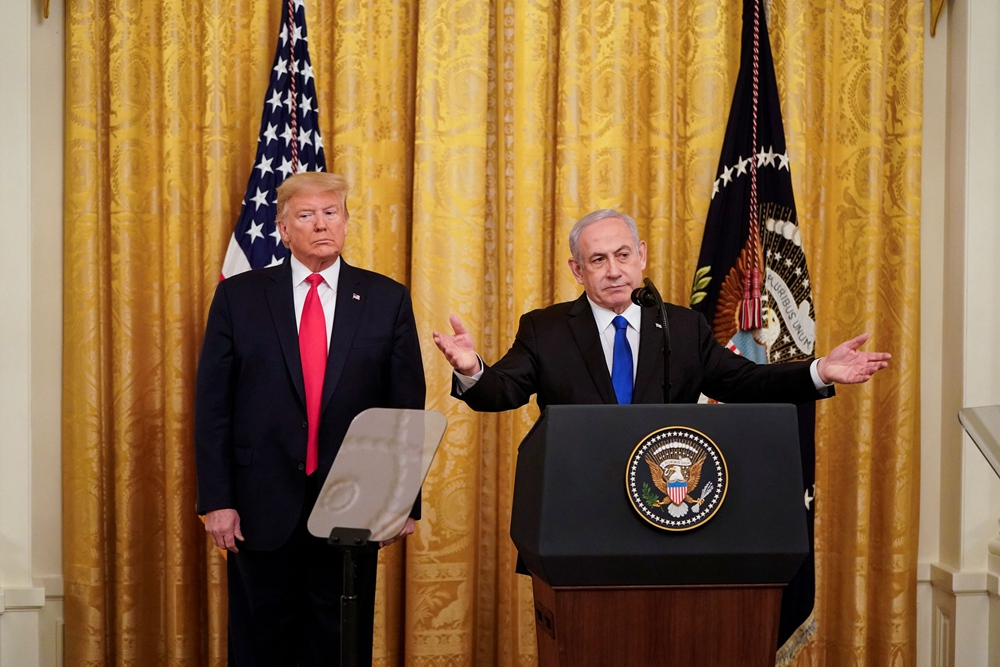
U.S. President Donald Trump and Israeli Prime Minister Benjamin Netanyahu (R) deliver joint remarks on a Middle East peace plan proposal in the East Room of the White House in Washington, DC, U.S., January 28, 2020. /Reuters Photo
U.S. President Donald Trump and Israeli Prime Minister Benjamin Netanyahu (R) deliver joint remarks on a Middle East peace plan proposal in the East Room of the White House in Washington, DC, U.S., January 28, 2020. /Reuters Photo
After Trump presented his peace plan, Netanyahu told reporters the U.S. recognizes Jerusalem as Israel's undivided capital, "by which I mean, within its fences," an apparent reference to municipal boundaries.
The right-wing leader, who faces a new election in March, said he would bring a proposal for applying Israeli jurisdiction to the Jordan Valley, the northern Dead Sea and West Bank settlements for Cabinet approval at its next session, probably on Sunday.
"Israel is offering the Palestinians, at the end of the process, conditional, limited sovereignty," Netanyahu said.
The plan presented a "realistic path" for achieving a lasting peace in the region, he said. "And on this day, you too have charted a brilliant future, a brilliant future for Israelis, Palestinians and the region, by presenting a realistic path to a durable peace," Netanyahu said.
UN committed to two-state solution on 'pre-1967 lines'
UN Secretary-General Antonio Guterres is committed to helping Israel and the Palestinians broker peace on the basis of UN resolutions, international law, bilateral agreements and the vision of two states based on pre-1967 borders, his spokesman Stephane Dujarric said in a statement after the U.S. unveiled its plan.
00:41
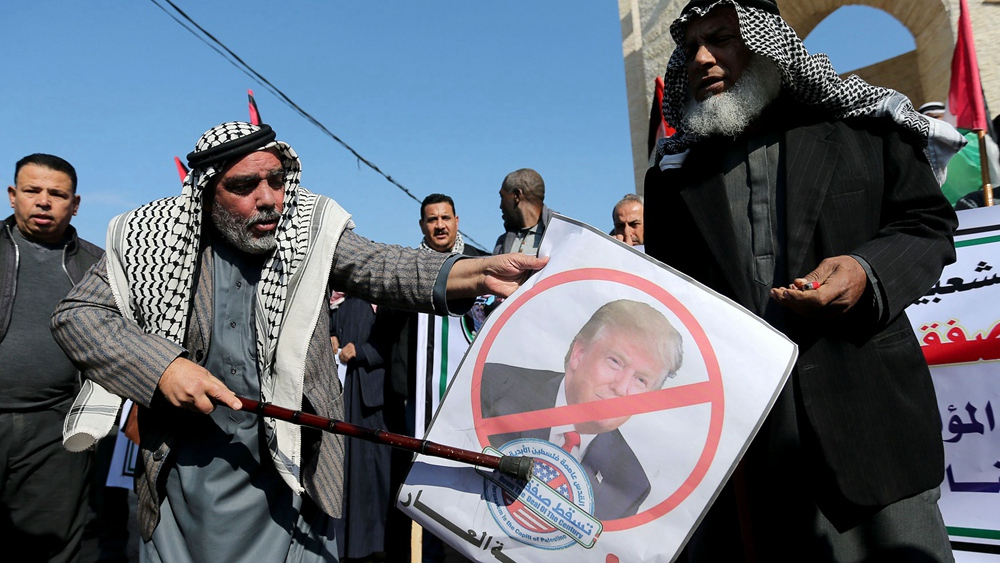
One such UN resolution was adopted by the Security Council a month before Trump took office in January 2017. The resolution demanded an end to Israeli settlements, with 14 votes in favor and one abstention by former U.S. President Barack Obama's administration.
In 1967, Israel swept to victory over its Arab neighbors in the Six Day War, also known as the Third Arab-Israeli War, and took control of East Jerusalem, the West Bank, and the Gaza Strip.
For years, the Palestinians have been seeking to establish an independent state with East Jerusalem as its capital city in light of a UN-proposed two-state solution based on the pre-1967 borders.
World divided over Trump's plan
Responses to Trump's controversial announcement have been divided across the world: Britain and Saudi Arabia voiced their support, some were reluctant to take sides, whereas Iran and Turkey strongly condemned the plan.
British Prime Minister Boris Johnson's spokesperson said the plan could be a positive step.
"The leaders (Johnson and Trump) discussed the United States' proposal for peace between Israelis and Palestinians, which could prove a positive step forwards," he said.
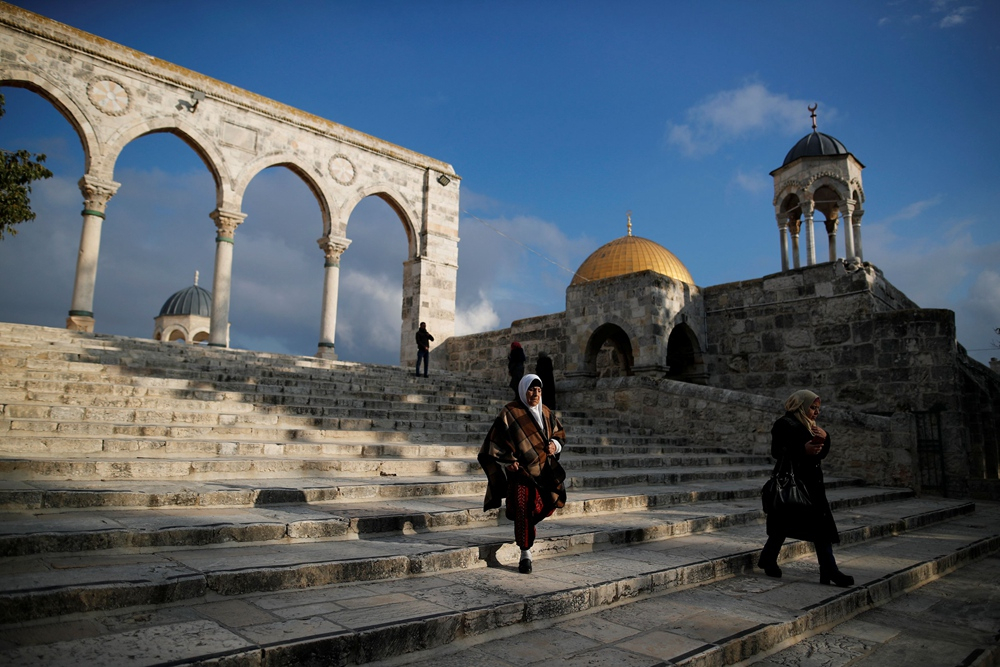
The Dome of the Rock is seen in the background as people visit the compound known to Jews as Temple Mount and to Muslims as Noble Sanctuary, in Jerusalem's Old City, January 28, 2020. /Reuters Photo
The Dome of the Rock is seen in the background as people visit the compound known to Jews as Temple Mount and to Muslims as Noble Sanctuary, in Jerusalem's Old City, January 28, 2020. /Reuters Photo
Dominic Raab, Britain's foreign minister, called on Israeli and Palestinian leaders to give fair consideration to the initiative.
"This is clearly a serious proposal, reflecting extensive time and effort," said Raab in a statement. "We encourage them (leaders) to give these plans genuine and fair consideration, and explore whether they might prove a first step on the road back to negotiations," he said.
Saudi Arabia said it "appreciates" Trump's efforts to devise the plan and called for the start of direct talks between Israel and the Palestinians. A foreign ministry statement said that any disagreements with the plan should be resolved through negotiations.
The Qatari foreign ministry said the country appreciates the American efforts to find solutions to the Arab-Israeli conflict as long as they are within the framework of international legitimacy. But it added that peace cannot be achieved without safeguarding the rights of Palestinians by establishing a sovereign state on the 1967 borders.
Josep Borrell, EU high representative for foreign affairs and security policy, said the European Union will study and assess the plan and pledged the EU's "firm and united commitment to a negotiated and viable two-state solution."
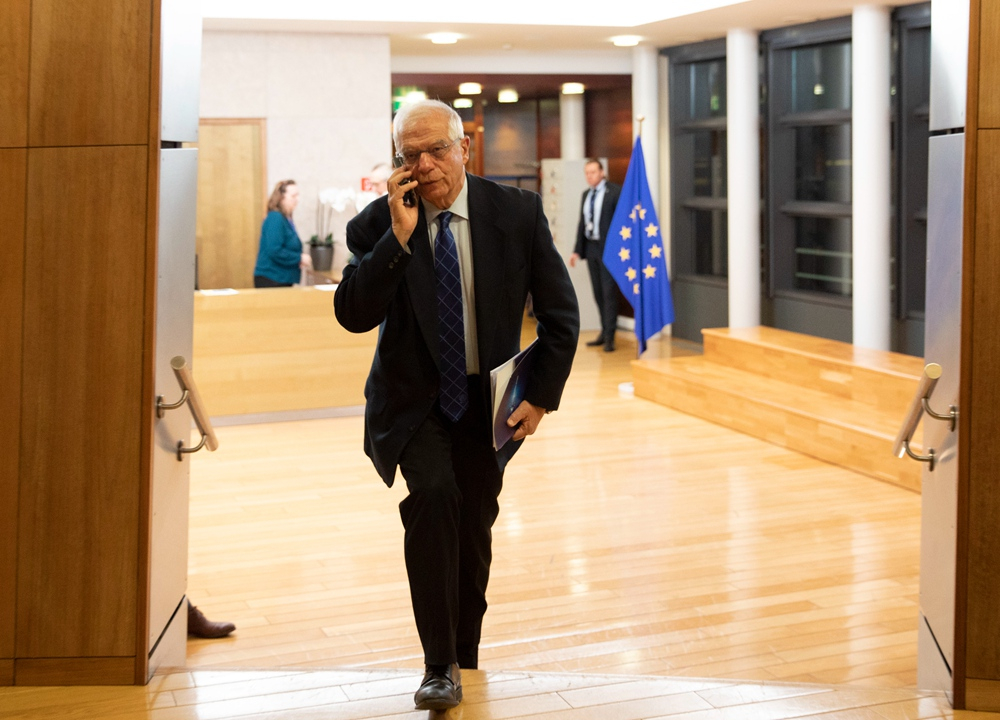
The EU's foreign policy chief, Josep Borrell, arrives for an extraordinary meeting of the EU college of commissioners in Brussels, Belgium, January 8, 2020. /AP Photo
The EU's foreign policy chief, Josep Borrell, arrives for an extraordinary meeting of the EU college of commissioners in Brussels, Belgium, January 8, 2020. /AP Photo
France insisted on a "two-state solution" and said it would "carefully study" Trump's plan. Its foreign ministry said in a statement that "a two-state solution, in conformity with international law and internationally-agreed parameters is necessary for the establishment of a just and lasting peace in the Middle East."
Meanwhile, Arab League (AL) Secretary General Ahmed Aboul-Gheit said imposing any solutions to the Palestinian-Israeli conflict will not succeed, noting that the U.S. plan will be discussed during an upcoming emergency ministerial meeting of the AL council in a way that guarantees Arab and Palestinian interests.
Aboul-Gheit highlighted negotiations between Palestinians and Israelis as the only way to achieve a real, serious and balanced peace deal.
The Iranian foreign ministry strongly rejected the U.S. plan as "disgraceful," with the ministry's spokesman Abbas Mousavi saying it is the "betrayal of the century" and is "doomed to failure."
"Palestine belongs to the Palestinians," he said. "The Zionist regime (of Israel) is an occupying regime, and the only way to settle the Palestinian cause is a referendum among the real inhabitants of the lands."
Iran is ready to cooperate at any level to forge unity in the Muslim world and "thwart the big plot that has endangered Muslim nations," the spokesman added.
The Turkish foreign ministry called Trump's plan a "stillborn."
"This plan is an annexation plan aiming to destroy the two-state solution and seize Palestinian territories," the ministry said in a statement. "Turkey would not allow any step seeking to legitimize Israel's occupation and atrocities."
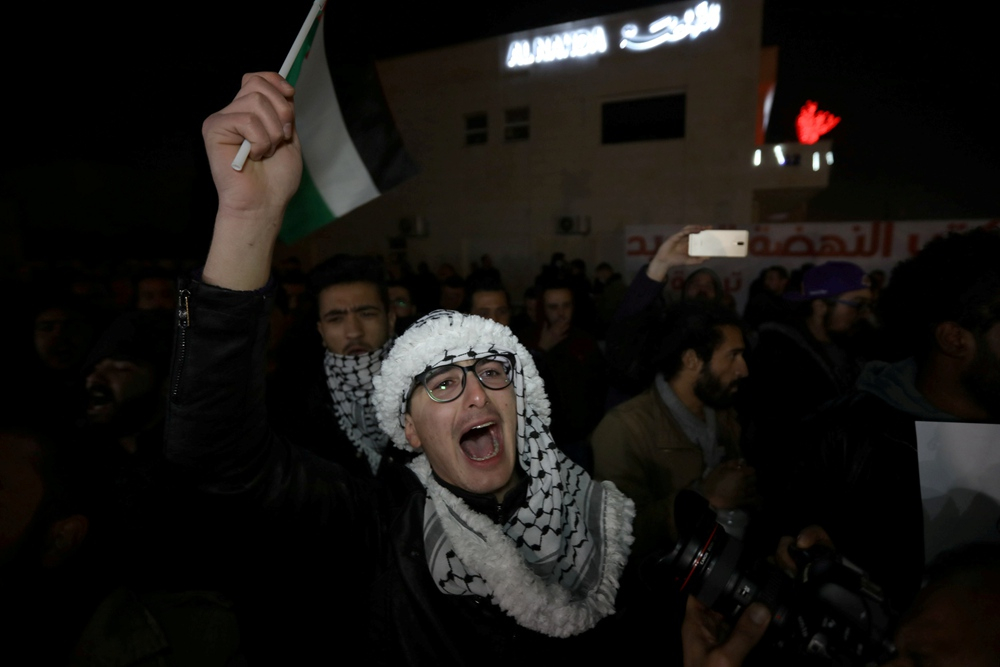
A man shouts slogans during a protest against U.S. President Donald Trump's proposed Middle East peace plan, near the U.S. embassy in Amman, Jordan, January 28, 2020. /Reuters Photo
A man shouts slogans during a protest against U.S. President Donald Trump's proposed Middle East peace plan, near the U.S. embassy in Amman, Jordan, January 28, 2020. /Reuters Photo
Jordan also warned against the "annexation of Palestinian lands." Its foreign minister, Ayman Safadi, called for direct negotiations between Palestine and Israel that solve all final status issues in a comprehensive solution in accordance with established terms of reference, the Arab peace initiative and international law.
Establishment of a Palestinian state with East Jerusalem as its capital on the basis of a two-state solution is the only path to comprehensive and lasting peace, Safadi said in a statement.
Dozens of protesters gathered outside the U.S. embassy in Amman to protest Trump's plan, shouting slogans including "No to normalization" and "We will not recognize Israel."
Calling the plan a "deal of shame," Lebanon's Hezbollah movement said it was a very dangerous step which would have negative consequences on the region's future.
Mohammed Ali al-Houthi, a leader of Yemen's Houthi rebels, said Trump's proposal was "blatant U.S. aggression on Palestine and the nation."
(With input from agencies)